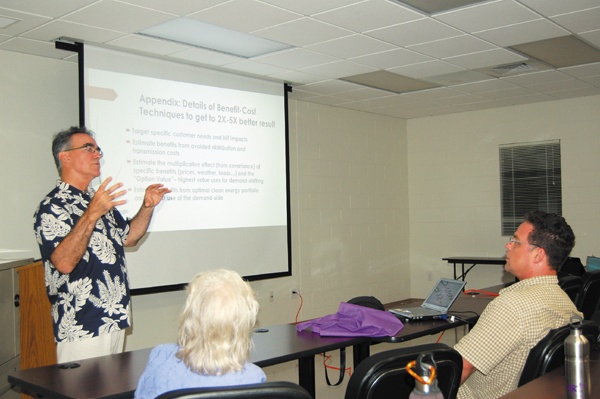PUHI — A California-based energy expert said Kauai Island Utility Cooperative officials and ratepayers must bolster engagement efforts to achieve the cooperative’s long-term renewable energy goals. “We need to sort of open up, find a bigger vision, step away from
PUHI — A California-based energy expert said Kauai Island Utility Cooperative officials and ratepayers must bolster engagement efforts to achieve the cooperative’s long-term renewable energy goals.
“We need to sort of open up, find a bigger vision, step away from today (and) step to tomorrow,” said Eric Woychik, an executive consultant at Strategy Integration, LLC, said during a Apollo Kauai forum held Tuesday at Kauai Community College.
Under current KIUC plans, cooperative officials are seeking to generate half of its electricity by 2023.
Woychik, who served as a panelist during the Kauai Economic Development Board’s 2013 Energy Conference, said this goal is attainable but must be achieved as a collaborative effort between cooperative officials and ratepayers.
The software systems that can collect customer data and detect electricity usage, such as smart meters, play a key role in identifying problems and areas of improvement within the cooperative’s energy grid, Woychik said.
To date, KIUC spokesman Jim Kelly said about 29,000 smart meters have been installed since last year.
The challenge, Woychik said, is integrating the collected data to optimize the cooperative’s existing system and improve efficiency, demand response and distribute energy generated from renewable resources, such as photovoltaic systems.
“There are a whole bunch of things that are going on here on Kauai that really support this and are moving this in the right direction,” Woychik said. “This is a very ripe situation, I believe, for this kind of methodology and I think it’s needed.”
Kelly said the cooperative is beginning to see trends from smart meter data and using it to help ratepayers manage their energy use and increase awareness about their consumption.
Officials, he said, are also working to host more public meetings where ratepayers can view the cooperative’s plans and help steer it in the right direction. But more voices, he said, are needed in the conversation.
In all, about 140 people attended this year’s annual KIUC membership meeting last month at Kauai Community College — a number that held steady over the past several years.
“I think we always have to keep working on getting more people engaged and not just having the same core of people who are always the same voices talking about where we should be going,” Kelly said.
The cooperative, Woychik said, should also focus on several key areas, such ask creating aggressive building and appliance energy efficiency standards; using conservation techniques that would target energy use at specific times; using distributed energy generated from various sources, including photovoltaic fixtures, at the right time; and optimizing current electrical systems to save energy costs.
But the onus of ensuring that energy goals are met and executed properly should not only fall upon cooperative officials alone.
Woychik said ratepayers should also be vocal about key KIUC decisions and become engaged by attending public meetings and researching the impacts and mechanics of different energy options.
“I’m envisioning a future where you can help define your vision and you could be a part of that and really make that happen,” Woychik said. “If you want to get to 100 percent renewables, I think you can get there. If you can see that vision and start to be a part of it, you can create a groundswell — that groundswell becomes a movement, a real change and presents a real opportunity to make that happen.”
Some KIUC ratepayers, however, say cooperative officials can and should do more for them. Kilauea resident Doug Wilmore said he concerned that the cooperative’s high electricity rates, among other factors, is “hampering engagement between our community and the power company.”
To ease what Wilmore said is “an arising tension between KIUC and homeowners who are now doing rooftop solar,” Woychik said KIUC officials must use data from software tools to identify power quality and distribution system impacts and create appropriate solutions.
Apollo Kauai Co-chair Sharry Glass said she felt encouraged by Woychik’s suggestions and explained that cooperation between KIUC officials and members will be crucial to the organization’s success.
“We’re one island, we all belong to the coop, and the idea’s that he (Woychik) is giving us are exactly the path that we’ve envisioned,” Glass said. “The inclusion of everyone as stakeholders is so important, and if we can get all of the stakeholders together, we can come up with a plan that will bring us to 100 percent clean, renewable energy. We can do it.”


